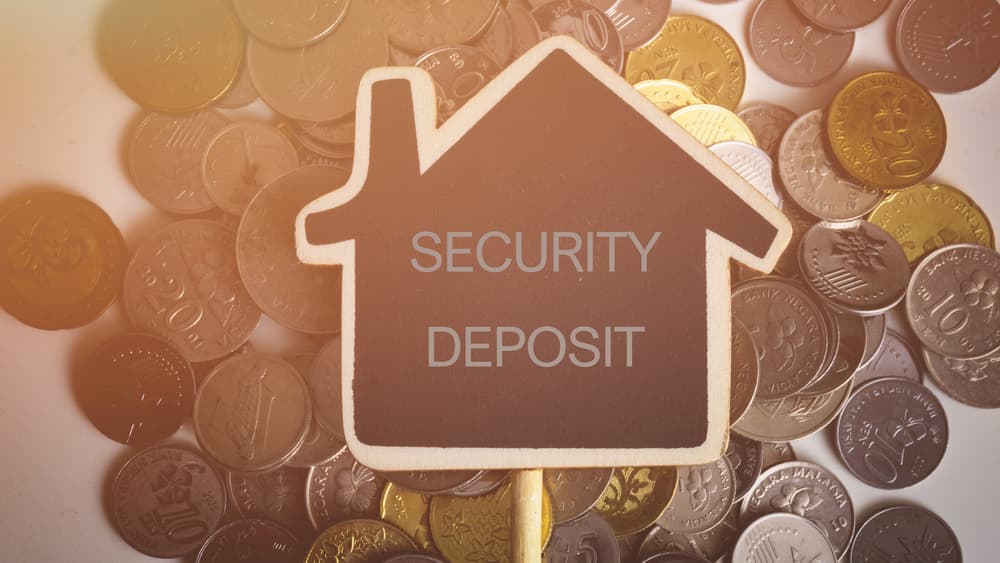
When you’re planning a move, figuring out your expenses is an important part of the process. One of the costs to expect is the security deposit – but you might be wondering, how much is a security deposit for renting a house, usually?
A few different variables can affect the average security deposit amount for a rental home, including the community, property management company, and more. Let’s take a closer look at the topic and break down what you can expect.
What is the Average Security Deposit for a House?
The average security deposit cost for a home is typically equal to the rent amount for one month. In many cases, you will be required to pay the first month’s rent and the security deposit at move-in, so budget accordingly.
Four key factors help determine how much a security deposit costs:
-
- State law
-
- The cost of a property’s monthly rent
-
- Market competition
-
- Included amenities (including a washer/dryer, private parking, new renovations, community amenities, and more)
So, what is the purpose of a security deposit? Essentially, it’s designed to serve as protection for the landlord or property management company in the event of nonpayment or damage. And although it may initially seem overwhelming to set aside this amount, remember that security deposits are often fully refundable (assuming you don’t damage the property).
If you plan to move in with a pet, you might also need to pay an additional pet deposit – more on that later.
Where Can I Find the Security Deposit Amount for a Home?
The security deposit cost for a rental home should be on the application. It is required to be clearly stated on the lease. Before you sign any paperwork, get the exact security deposit amount in writing.
How Much Can a Landlord Charge for a Security Deposit?
The landlord has the freedom – to a certain degree – to charge what they’d like for the deposit. Most landlords stick with the traditional one month’s rent, but some deviate from that. However, suppose most rentals in your area change a month’s rent as the security deposit. The odds are pretty good that your prospective landlord will do the same (to remain competitive).
Keep in mind that most states have a legal limit for security deposits, so check your local laws if the amount seems unusually high.
Why Would a Landlord Charge More Than One Month Rent for the Security Deposit?
In certain cases, it’s simply the policy to charge a new tenant 1.5 or 2 times the monthly rent as a deposit.
However, you may also be charged a higher amount if you have a less-than-stellar credit history. Particularly if you’ve had past instances of nonpayment, the landlord may opt to charge a higher security deposit to protect themselves financially.
Can My Security Deposit Be Used as Rent?
No, your security deposit is not intended to be used as rent.
However, some lease agreements state that the tenant will pay the first and last month’s rent instead of a security deposit. In that case, your final month of rent is already paid for when it comes time to move out.
Pet Deposits
Nearly all rental properties charge an additional deposit for pets, except for service or therapy animals. Regardless of whether your pet is a service animal, you are still financially liable for any damages they cause.
Pet deposits may be refundable or non-refundable. Alternatively, you may not be required to pay a pet deposit and be charged monthly pet rent (usually $10-30 per month).
When is the Security Deposit Less than One Month’s Rent?
Some communities, specifically those that operate as low-income tax credit properties, may have lower security deposits that equal less than a month’s rent. This is designed to make move-in more accessible for those on a limited income.
Some landlords or property managers might offer to waive the security deposit to attract new tenants if there is considerable market competition.
How Do I Get My Security Deposit Back?
First and foremost, confirm that the security deposit is refundable before signing your lease agreement. Then, ask to see the requirements for a security deposit refund and make sure you get a copy in writing or request it be written in the rental agreement.
From there, here’s how to get a security deposit back with ease:
-
- During the initial walk-through, take photos and clear, detailed notes. Make sure any existing issues or damage are included on the walk-through sheet.
-
- Before you move out, repair any damage that you are liable for. But first, check with your landlord/property manager to ensure you aren’t inadvertently doing unnecessary work. Depending on your lease, your move-out tasks could include:
-
- Filling nail holes
-
- Hiring a professional to repaint walls
-
- Scheduling a professional carpet cleaning
-
- Before you move out, repair any damage that you are liable for. But first, check with your landlord/property manager to ensure you aren’t inadvertently doing unnecessary work. Depending on your lease, your move-out tasks could include:
-
- Read your entire lease agreement to make sure you are familiar with all of the expectations – you don’t want an unpleasant surprise at move-out!
-
- Follow all rules for the move-out process, and write and deliver a proper Notice of Intent to Vacate within the expected timeframe.
-
- Take photos and document, document, document!
Move-In with a Property Management Company You Can Trust
The bottom line is this: security deposits are a necessary part of the move-in process, but dealing with them is much easier when working with a property manager you know you can trust.
Our team professionally manages every Wan Bridge build-to-rent community, so you can be confident you will be well taken care of. For more information about our communities, rental details, and more, contact us at Wan Bridge today!






